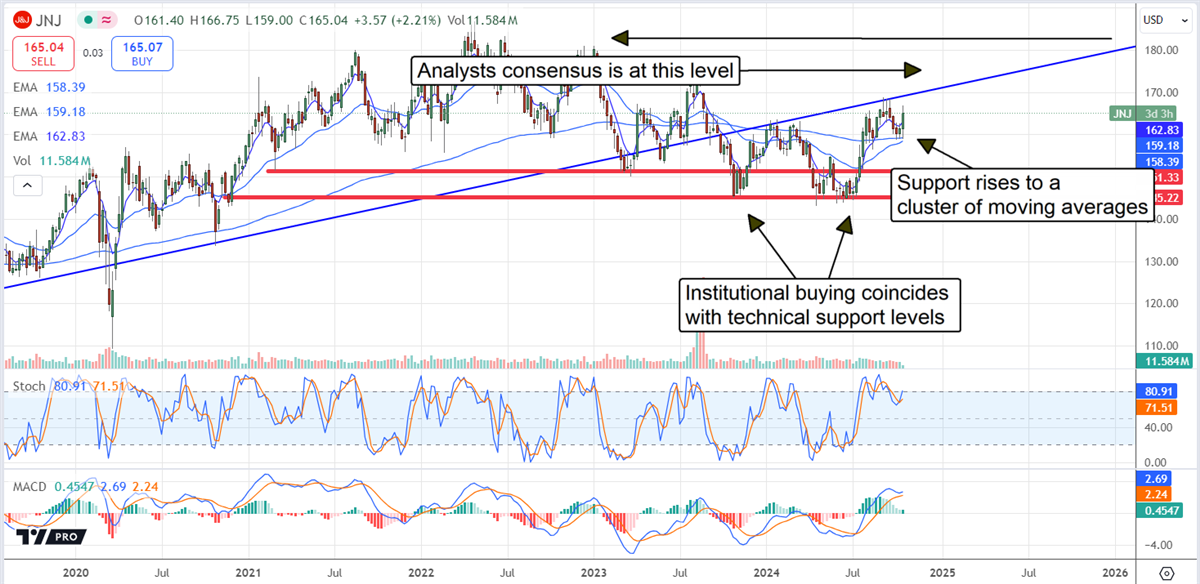
Johnson & Johnson’s (NYSE: JNJ) stock price advance has been reinvigorated. The stock price rally stalled a few years ago due to the COVID-19 bubble bursting and the divestiture of Kenvue (NYSE: KVUE), but those days are behind, and business growth is still ahead. Today, Johnson & Johnson is a buy because its value, yield, and growth outlook provide a vehicle capable of market-beating returns in 2025 and over the long term.
Regarding value, this healthcare stock is trading at 16x this year’s earnings, less than half the historical average price multiple and well below the S&P 500 average. Regarding returns, Johnson & Johnson is a reliable dividend payer yielding more than 3%, more than double the broad market average, and at the high end of the historical range with a solid outlook for sustained distribution increases over the next few years.
Johnson & Johnson Turns a Corner in Q3 2024
Johnson & Johnson turned a corner in Q3 2024 with operational growth resulting in reported growth as comps to the COVID and pre-spinoff periods lapse. Reported growth is expected to continue in Q4 and next year, accelerating in 2025.
Regarding Q3, the company reported a 5.2% YoY increase in revenue driven by strengths in both operational regions and segments. Operational growth was more robust at 6.3% and 5.4% adjusted for COVID-19, with U.S. sales up by 7%, leading International’s 4.6% growth and growth even near 6.35% in the Internal Medicine and Medical Technology segments. Internal Medicine and MedTech are driven by sustained strengths in existing treatments compounded by new approvals and product launches during the quarter.
The margin news is mixed but favorable to investors. Acquisitional costs, including acquired IPRD expenses, impacted GAAP and adjusted profits, but much less than expected. Because of this, GAAP and adjusted EPS, including IPRD costs, were contracted, but the impact of IPRD is worth 1900 basis points and is more than sufficient to offset the decline. Adjusted EPS is also 950 basis points better than expected.
The guidance is also mixed but favorable to shareholders. The company raised its guidance for revenue due to organic strength and the impact of the V-Wave acquisition but trimmed its target for earnings. The takeaway is that revenue is forecast above the consensus analysts' target, the impact of the acquisition on earnings will diminish, and earnings are sufficient to sustain the capital return program, which is robust. The healthy dividend is compounded by share repurchases, which reduced the count by 4.7% in the quarter and 6.6% compared to last year.
Institutions Signal the Floor for Johnson & Johnson Is $145
Institutional and analyst activity has been mixed over the last year, with intermittent selling periods and numerous negative revisions. However, institutional buying in 2024 coincides with price rebound in Q1 and Q3, which show solid support at the $145 level, which coincides with the low end of the analysts' target range. Institutional activity could provide a tailwind in Q4 because activity in the first weeks remains bullish on balance.
Analyst activity is also shifting toward a more bullish bias. The activity in early October includes two reiterated Outperform ratings with price targets above the consensus reported by MarketBeat.com. The consensus of $175 implies a 5% upside and is rising in Q3 compared to last year and last quarter, with the upside range adding another $40 or nearly 25%.
The technical outlook is bullish. The market for JNJ stock is range-bound within a multiyear range but moving upward within it. The latest activity shows the market in rally mode and consolidating beneath a critical uptrend line, setting up to move higher over the coming weeks. Assuming the market follows through on the signal, JNJ could hit the top of the range near $180 by early 2025.

